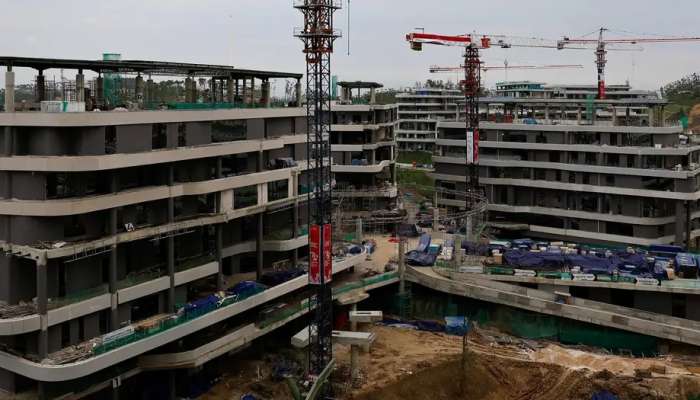
Jakarta: Indonesia last month celebrated its 79th Independence Day in Nusantara, which is set to become the country's new capital city by 2045.
Located in the eastern part of Borneo, the unfinished Nusantara is being promoted as a sustainable, high-tech alternative to the current overcrowded and polluted capital, Jakarta, which is situated on Java Island and is gradually sinking.
Indonesian President Joko Widodo, also known as Jokowi, led the August 17 ceremony with President-elect Prabowo Subianto, who is due to assume office next month.
Nusantara is expected to be a green city
built with a circular economic concept aimed at eliminating waste and fostering the continual use of resources.
But amid the grand ceremony, concerns were raised by the nearby indigenous Balik community, who grapple with the cultural and environmental repercussions stemming from the $32 billion (€31.7 billion) capital construction project.
Environmentalists have warned of potential ecological disaster caused by building a capital city in one of the world's biggest stretches of rainforest which houses some rare and endangered species, including orangutans, proboscis monkeys and clouded leopards.
There have been additional concerns from Indigenous tribes, such as the Balik people, who are native to the forested area of Borneo's East Kalimantan where the new capital is being constructed. They are among the communities most affected by Indonesia's plan to relocate its capital to Nusantara.
Nusantara's growth threatens ancestral water sources
DW visited a Balik community, where around 70 families have been living for generations. Several traditional houses that were made of ironwood still stand firmly amid the newly built brick houses.
They live around 10 kilometres (about 6 miles) from Nusantara, but their land is one of the areas earmarked for further development of the new capital.
Sibukdin, the leader of the Balik community, accompanied DW to visit the Sepaku River flowing near to their village before the construction began.
He said that his community used to source water from the river for daily use, including drinking.
"Yet, due to significant pollution, we can no longer do so. The water is contaminated by rotten wood, and ecosystems have suffered," he told DW.
The river water appeared discolored and seemed to be covered by a fine layer of sediment. A pile of waste has blocked the flow of the river.
Vision of sustainability amid Indigenous hardships
The Indonesian government envisions future Nusantara residents will be able to drink water directly from the faucets in their homes and offices. Water will be resourced from the Sepaku Dam built on the river.
The construction of the capital adds to the challenges faced by the Indigenous communities in the area, who have already been in conflicts with palm oil plantations.
Sibukdin is worried about potential eviction from their ancestral land. Like many Indigenous populations, many residents lack formal ownership certificates for the houses and land they have inhabited for multiple generations.
Jakia, 48, a female resident who has been living there for as long as she can remember, told DW that many people in her community must now buy water for daily needs.
The air quality also troubles her. Jakia often sweeps her yard to clean it from dust. While the water supply is limited, she waters the yard occasionally to reduce the intensity of the dust. She coughed often during an interview with DW.
"It has been three months since it got worse. Dust like I have never seen before. After there was construction there, down there, so many cars passed by every day. It has become a dusty road," she said. "I also wear a mask. Even when I'm inside."
A green city or a threat to biodiversity?
The Balik tribe's ancestral land consists of tropical forests, mangrove forests and small waterbodies. Many people still gather food such as fruits and fish from their surroundings, as well as herbal products that they believe could cure ailments.
Earlier this year, researchers found out that the habitat of 1,449 proboscis monkeys — about 37% of the species population — overlapped with the current spatial plan of Nusantara.
They raised concerns that the construction of the new capital will impact the proboscis monkeys' habitat in nearby Balikpapan Bay.
Greenpeace Indonesia wrote that despite the promise of being a green city, the Nusantara project is itself a significant threat to biodiversity. Within the Nusantara project boundary, 20,000 hectares of forest were lost over the past five years, mostly to logging and industrial plantations, according to the NGO.
"Today, there is only 31,364 hectares of native forest remaining within the greater Nusantara boundary, including a mangrove forest area of 12,819 hectares," Greenpeace wrote in an email to DW.
Jakia has deep concerns for her health and the air quality in her village. She has called on the government to pay more attention to Indigenous people's voices if they are serious about protecting the environment and the communities living there.
"Indigenous people are important to protect the forest, because we do not destroy the forest, instead we protect it," she said.